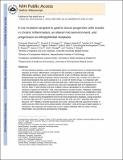K-ras Mutation Targeted to Gastric Tissue Progenitor Cells Results in Chronic Inflammation, an Altered Microenvironment, and Progression to Intraepithelial
Author(s)
Okumura, Tomoyuki; Ericksen, Russell E.; Takaishi, Shigeo; Wang, Sophie S. W.; Dubeykovskaya, Zinaida; Shibata, Wataru; Betz, Kelly S.; Muthupalani, Sureshkumar; Rogers, Arlin B.; Fox, James G.; Rustgi, Anil K.; Wang, Timothy C.; ... Show more Show less
DownloadFox-2010-K-ras Mutation.pdf (1.148Mb)
OPEN_ACCESS_POLICY
Open Access Policy
Creative Commons Attribution-Noncommercial-Share Alike
Terms of use
Metadata
Show full item recordAbstract
Chronic infectious diseases, such as Helicobacter pylori infection, can promote cancer in a large part through induction of chronic inflammation. Oncogenic K-ras mutation in epithelial cells activates inflammatory pathways, which could compensate for a lack of infectious stimulus. Gastric histopathology and putative progenitor markers [doublecortin and calcium/calmodulin-dependent protein kinase-like 1 (Dcamkl1) and keratin 19 (K19)] in K19-K-ras-V12 (K19-kras) transgenic mice were assessed at 3, 6, 12, and 18 months of age, in comparison with Helicobacter felis–infected wild-type littermates. Inflammation was evaluated by reverse transcription–PCR of proinflammatory cytokines, and K19-kras mice were transplanted with green fluorescent protein (GFP)–labeled bone marrow. Both H. felis infection and K-ras mutation induced upregulation of proinflammatory cytokines, expansion of Dcamkl1+ cells, and progression to oxyntic atrophy, metaplasia, hyperplasia, and high-grade dysplasia. K19-kras transgenic mice uniquely displayed mucous metaplasia as early as 3 months and progressed to high-grade dysplasia and invasive intramucosal carcinoma by 20 months. In bone marrow–transplanted K19-kras mice that progressed to dysplasia, a large proportion of stromal cells were GFP+ and bone marrow–derived, but only rare GFP+ epithelial cells were observed. GFP+ bone marrow–derived cells included leukocytes and CD45− stromal cells that expressed vimentin or α smooth muscle actin and were often found surrounding clusters of Dcamkl1+ cells at the base of gastric glands. In conclusion, the expression of mutant K-ras in K19+ gastric epithelial cells can induce chronic inflammation and promote the development of dysplasia.
Date issued
2010-11Department
Massachusetts Institute of Technology. Division of Comparative MedicineJournal
Cancer Research
Publisher
American Association for Cancer Research
Citation
Okumura, T. et al. “K-ras Mutation Targeted to Gastric Tissue Progenitor Cells Results in Chronic Inflammation, an Altered Microenvironment, and Progression to Intraepithelial Neoplasia.” Cancer Research 70 (2010): 8435-8445.
Version: Author's final manuscript
ISSN
0008-5472
1538-7445